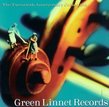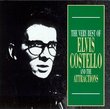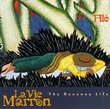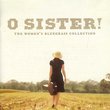| All Artists: Omar Sosa Title: Sentir Members Wishing: 0 Total Copies: 1 Label: Ota Records Release Date: 3/12/2002 Album Type: Import Genres: International Music, Jazz, Latin Music Style: Latin Jazz Number of Discs: 1 SwapaCD Credits: 1 UPCs: 616444100925, 4037688902421 |
Search - Omar Sosa :: Sentir
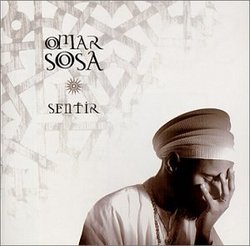 | Omar Sosa Sentir Genres: International Music, Jazz, Latin Music
Omar Sosa moves from idea to idea, sound to sound, and theme to theme with the attention span of a 4-year-old boy with ADD. Once the Cuban-born pianist immigrated to San Francisco in 1995, he released several albums in ... more » ![header=[] body=[This CD is available to be requested as disc only.]](/images/attributes/disc.png?v=cdde0dc6) ![header=[] body=[This CD is available to be requested with the disc and back insert.]](/images/attributes/disc_back.png?v=cdde0dc6) ![header=[] body=[This CD is available to be requested with the disc and front insert.]](/images/attributes/disc_front.png?v=cdde0dc6) ![header=[] body=[This CD is available to be requested with the disc, front and back inserts.]](/images/attributes/disc_front_back.png?v=cdde0dc6) |
Larger Image |
CD DetailsSynopsis
Amazon.com Omar Sosa moves from idea to idea, sound to sound, and theme to theme with the attention span of a 4-year-old boy with ADD. Once the Cuban-born pianist immigrated to San Francisco in 1995, he released several albums in quick succession, each with little in common with the others and each featuring a different lineup and influences. Sentir offers an interesting mix of several Moroccan musicians, a rapper, a Cuban vocalist, a Venezuelan percussionist, and the hyperactive Sosa on piano. As one would imagine, there are surprises around every bend as the album unfolds. Highlights include choruses of interwoven vocals--particularly on "Sister in Yellow"--the rich calliope and percussion throughout, and the romantic "Tres Notas en Amarillo." Somehow the Moroccan-Cuban-Latin fusion works for Sosa. This is in part because the songs move along quickly, seldom waiting for ideas to play out. But it's also due to taste and pacing: the album contains some quiet moments that give the listener time to breathe. For music fans with a bent for musical multiculturalism, Sentir is a global music adventure well worth taking. --Tad Hendrickson Similarly Requested CDs
|
CD ReviewsMore glorious, idiosyncratic music from the great Omar Sosa Jan P. Dennis | Monument, CO USA | 03/06/2004 (5 out of 5 stars) "This is the first I've heard him utilizing an expanded sound palette, and it's pretty spectacular. My previous experiences of Omar Sosa have been in solo or duet settings (see my reviews of New Life, Pictures of Soul, and Ayaguna). Incorporating a huge variety of musical influences, including Moroccan, Venezuelan, American urban, contemporary and straight-ahead jazz, and traditional Cuban, the prodigiously talented emerging Cuban superstar world-jazz pianist on Sentir seamlessly melds these disparate influences into an astounding musical tapestry the likes of which have never before been put to disc before, at least in my rather extensive experience.I was a little leery of this approach, seeing as it encompasses genres (rap, hip-hop, spoken word) I don't generally listen to. And having been recently burned, at least in my considered judgment, by the highly regarded (in some quarters, at least) hybrid disc featuring Vijay Iyer and Mike Ladd, In What Language, it did (I must admit) take me a while to warm up to this disc. But I trusted my instincts and kept listening to it, and I'm glad I did. Strangely, Sosa's piano playing sounds much more traditionally Cuban, and may be regarded as situated solidly in a wider Latin tradition, on this disc than on his solo or duo offerings, which sound strikingly original, idiosyncratic, and a-referential. That's because, I think, here he wants to see his instrument fully integrated into the larger musical perspective he's here concerned with; that is, he doesn't want it sticking out by it's a-traditional weirdness, unseemingly drawing attention to itself.OK, I'm going to come clean. There's no use writing these reviews if they're not going to be as transparent as one can reasonably make them. Simply stated, the themes of this album seem naively in the peace-and-justice camp. I have nothing particular against this orientation; indeed, as a Catholic Christian, many of my co-religionists espouse such a viewpoint. (Note: I know it's not entirely kosher to bring politics and religion into these reviews; some of the best reviewers--perhaps rightly--eschew this approach. But there are times when I feel it's appropriate, especially if the material I'm reviewing operates in that world.) In any case, even though the peace-and-justice approach may be politically and religiously naïve, that doesn't preclude it from being the means of profound aesthetic statement. Some of Bruce Cockburn's work might be seen in a similar light, esp. "If I Had a Rocket Launcher." To me, this is a terminally stupid song, if considered simply from the standpoint of the plain meaning of its lyrics. This kind of alienation from America and the West, seen, perhaps, most clearly in the films of Oliver Stone, is entirely unattractive to me. But the underlying sentiments such a point of view seeks to express, i.e., concern for the oppressed and downtrodden, for the victims of globalization, world capitalism, and other depredations of modern life, are entirely valid. That they've received expression in a naïve and artless way doesn't negate their validity. And when they come wrapped in wondrous soundscapes, as Cockburn's work often does and Sosa's work almost always does, one can forgive almost any amount of politico-religious inanity. At least that's how I see it.Despite having struggled to come to terms with his chosen format (and, eventually, genuinely come to appreciate it), I for one would like to hear him in an entirely wordless large group setting. I say this because the (sans lyrics) musical palette he creates on such numbers as "Oda al Negro" is so engaging, so aurally spectacular, that I long for an entire disc of this. Nevertheless, one must admit that the way he mixes English, Spanish, and, one presumes, other languages into glorious word-tapestries, is nothing short of astounding (most engagingly, perhaps, on "Sister in Yellow," which should win over even the most hardcore instrumental purist). My advice to those of you who like me might have reservations about the mixing of spoken word, rap, hip-hop, etc., with instrumental world jazz: Just go with the flow. Listen to that inner voice that seeks to bring harmony and reconciliation to all things. In a weird way, Omar Sosa's wildly eclectic approach begins to sound perfectly natural as one becomes more familiar with it. Indeed, some of the numbers are certainly enhanced by the vocals, e.g., "Tres Notas en Amarillo." In any case, I suggest that those of you who might be hesitant to try this because of its eclecticism put aside your doubts and seek to embrace its wonders without prejudice or reservation. That's what I've done, and I'm really glad I did." Cuba/Morocco, Venezuela/jazz stew - tasty! Pink Noodle | Duncanville, TX USA | 01/09/2008 (4 out of 5 stars) "Continuing the development his groundbreaking World-Jazz sound, Cuban composer and pianist Omar Sosa combines traditional vocals and rhythms from Cuba, Morocco and Venezuela with contemporary jazz harmonies and spoken word in an extraordinary new recording full of passion and spontaneity. Featured on the CD are Moroccan vocalist and multi-instrumentalist El Houssaine Kili, Cuban/Yoruba vocalist Martha Galarraga, and Venezuelan percussionist Gustavo Ovalles. As part of his ongoing exploration of the African roots of music in the Americas, Omar's concept for Sentir involves each musician using his or her own folkloric expressions and finding a common musical vocabulary for communication and improvisation. Another part of Omar's approach involves the use of color as the basis of musical expression and the commonality of these 'spiritual zones' or trance states within the African Diaspora. The result is a fresh and poignant sound - one that celebrates the strong affinity of traditional musical roots and religious ceremonies in these cultures. Omar brings together the guembri, a traditional musical instrument from the Gnawa culture of North Africa, with bata drums, and Afro-Venezuelan percussion instruments such as the quitipla and culo e' puya. The guembri replaces the usual acoustic bass, and the darbukkah and tan-tan, both percussion instruments from Morocco, often replace the smaller bata drums. Several tracks feature the lyrics of Washington, DC-based spoken word artist Sub-Z. Also contributing to the project are San Francisco-based percussionist John Santos and a number of Moroccan musicians including Yassir Chadly, Bouchaib Abdelhadi, and Moulay M'Hamed Enneji Fakihan (Nass Marrakech). -- calabashmusic(dot)com" Hear it, Feel it Arzurama | Seattle, WA United States | 06/14/2003 (4 out of 5 stars) "Open the windows, make some floor space, put Omar Sosa on and crank your CD player to the max. This collection isn't strong all the way through (hence the 4 stars), but when he scores, it's in a big way. "Cielo y Mar Azules" alone is worth trying it out. If you're a fan of Herbie Hancock's later experimentations, you'll dig this. The combination of African chants, free-form jazz, and urban rap riffs may initially disorient some, but stick with it. You'll grow into it...and the CD will grow permanent roots in your player!"
|

 Track Listings (13) - Disc #1
Track Listings (13) - Disc #1

